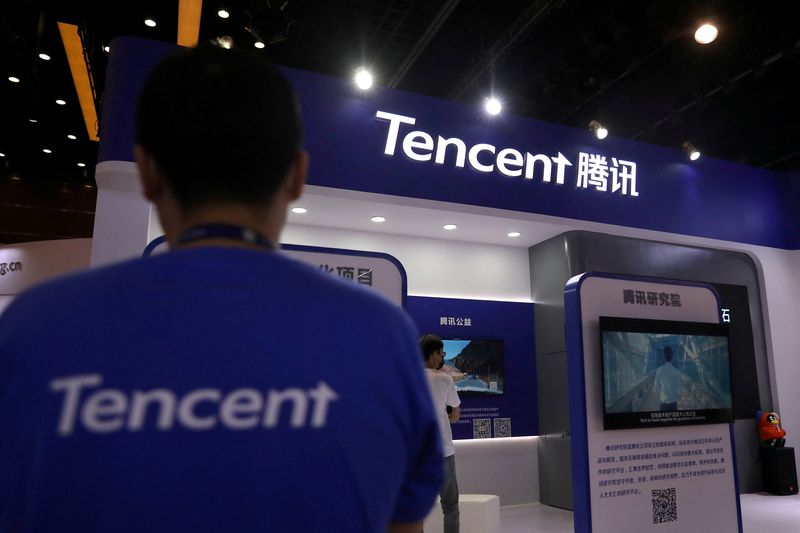By Josh Ye
HONG KONG (Reuters) -Tencent Holdings is abandoning plans to venture into virtual reality hardware, as a sobering economic outlook prompts the Chinese tech giant to cut costs and headcount at its metaverse unit, three sources familiar with the matter said. The world's largest video game publisher had ambitious plans to build both virtual reality software and hardware at an "extended reality" XR unit it launched in June last year, for which it hired nearly 300 people. It had come up with a concept for a ring-like hand-held game controller, but difficulties in achieving quick profitability and the large investment needed to produce a competitive product were among factors that prompted a shift away from that strategy, two of the sources said. One of the sources said the XR project was not expected to become profitable until 2027, according to an internal forecast. The second source said the unit also had a lack of promising games and non-gaming applications.
The sources declined to be named as the information is confidential. "Under the company's new strategy as a whole, it no longer quite fit in," the first source said. Earlier in the year, Tencent had also planned to buy gaming phone maker Black Shark, which it believed had supply chain and inventory experience that could beef up its hardware push and add 1,000 people to the unit.
However, it eventually walked away from that deal due to Tencent's shift in strategy, as well as mounting regulatory scrutiny and an expected lengthy review process, one of the sources who had direct knowledge of the matter said.
The sources said that Tencent had advised most of the unit's staff to seek other opportunities, confirming a Thursday report from Chinese tech news outlet 36Kr.
Tencent declined to comment on the Black Shark deal and whether Beijing's scrutiny had soured the deal. Regarding the status of the XR unit, the company referred to a statement to Reuters on Thursday that said it was making adjustments to some business teams as development plans for hardware had changed.
The company also said on Thursday that it was not disbanding the XR unit.
Tencent shares slipped as much as 2.5% after Reuters' report.
METAVERSE INTEREST
The launch of the XR unit came amid swelling global interest in the metaverse concept of virtual worlds and had marked a rare foray into hardware for Tencent, which is mostly known for software that includes a suite of games and social media applications.
It also entered into a race against Western peers such as Meta Platforms and Microsoft (NASDAQ:MSFT), which are building their own metaverses and have their own virtual reality hardware projects.
One of the sources said that Tencent had dabbled in virtual reality about seven years ago for a short while, and its interest in the area had been revived in 2021 after learning of new breakthroughs in pancake lenses and more powerful displays. Strong sales of Meta's Quest headset was also a driver, the person added.
But last year marked one of the toughest years for Tencent since its founding in 1998, with revenue battered by a regulatory crackdown and headwinds from measures to stop the spread of COVID-19.
Underlining such strains, its founder Pony Ma in December displayed a rare show of frustration at a year-end meeting when he lambasted senior managers for not working hard enough and said the company needed to focus on short video for future growth.
Several tech companies include Meta and Google (NASDAQ:GOOGL) have announced layoffs as they seek to trim costs amid rising fears of a global recession.
Pico, a virtual reality (VR) headset manufacturer owned by TikTok's Chinese developer ByteDance, said on Friday it was laying off a small number of people, after local media reported the start of hundreds of redundancies earlier this week. A source familiar with the matter said 200 staff were affected.
